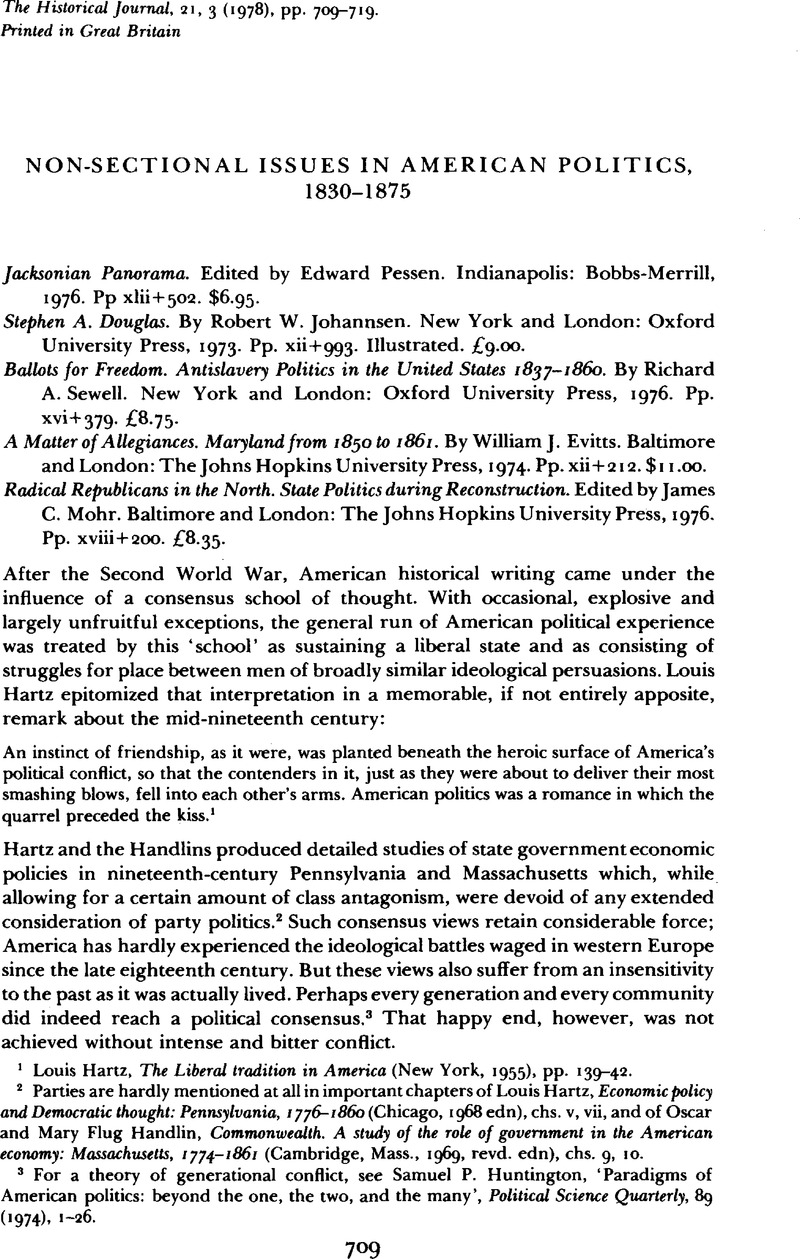No CrossRef data available.
Article contents
Non-Sectional Issues in American Politics, 1830–1875
Published online by Cambridge University Press: 11 February 2009
Abstract

- Type
- Review Articles
- Information
- Copyright
- Copyright © Cambridge University Press 1978
References
1 Hartz, Louis, The Liberal tradition in America (New York, 1955), pp. 139–42.Google Scholar
2 Parties are hardly mentioned at all in important chapters of Hartz, Louis, Economic policy and Democratic thought: Pennsylvania, 1776–1860 (Chicago, 1968 edn)Google Scholar, chs. v, vii, and of Oscar and Handlin, Mary Flug, Commonwealth. A study of the role of government in the American economy. Massachusetts, 1774–1861 (Cambridge, Mass., 1969, revd. edn), chs. 9, 10.Google Scholar
3 For a theory of generational conflict, see Huntington, Samuel P., ‘Paradigms of American politics: beyond the one, the two, and the many’, Political Science Quarterly, 89 (1974), 1–26.CrossRefGoogle Scholar
4 Pessen, Edward, Jacksonian America: society, personality and politics (Homewood, Ill., 1969)Google Scholar, Riches, class and power before the Civil War (Lexington, Mass., 1973).Google Scholar
5 For an excellent introduction to this problem, see Ratcliffe, Donald J., ‘The role of voters and issues in party formation: Ohio, 1824’, Journal of American History, LIX (1973), 847–70CrossRefGoogle Scholar; ‘The experience of Revolution and the beginnings of party politics in Ohio, 1776–1816’, Ohio History 85 (1976), 186–230, esp. 219–30.Google ScholarPhillips, Kim T., ‘The Pennsylvania origins of the Jackson movement’, Political Science Quarterly, xci (1976), 489–508.CrossRefGoogle Scholar
6 Johannsen, , Stephen A. Douglas, p. 27.Google Scholar
7 Dangerfield, George, The era of good feelings (London, 1953), pp. 175–83.Google Scholar For a variety of expressions of party feeling, see (Washington, D.C.) National Intelligencer 17, 19, 21 02, 7 04 1818.Google Scholar For congressional discussion of a federal bankruptcy law and federal aid for internal improvements, ibid. 19, 21 Feb., 19 March, 4 Apr. 1818, and for discussions of foreign policy, see ibid., 17, 31 March 1818.
8 This observation was made, in a different context, by Pole, J. R., ‘The creation of the American Republic’, Historical Journal, XIII (1970), 802.Google Scholar
9 National Intelligencer, 3, 17, 21 02, 5 03, 1818.Google Scholar
10 McFaul, John M., The politics of Jacksonian finance (Ithaca, 1972), pp. 72–8, 210–16.Google ScholarSharp, James Roger, The Jacksonians versus the banks (New York, 1970).Google Scholar
11 He lacked the local ties which Seward enjoyed and which are discussed in Brogan, Hugh, ‘Lincoln's comforter’, Historical Journal, xiv (1971), 645–54.CrossRefGoogle Scholar
12 On this and on the gross misrepresentations made by Republican newspapers in reporting events in Kansas in 1855–6, see Potter, David M. (completed and ed. by Fehrenbacher, Don E.), The impending crisis 1848–1861 (New York, 1976), pp. 162–5, 217–24.Google Scholar
13 Stevenson, J. W. to Stevenson, J. B., 30 11 1858.Google Scholar Thomas B. Stevenson papers, Cincinnati Historical Society.
14 May, Robert E., The southern dream ofa Caribbean empire, 1854–1861 (Baton Rouge, 1973), pp. 36–76, esp. pp. 37–40, 57–61.Google Scholar
15 The letters of Stephen A. Douglas, ed. Johannsen, Robert W. (Urbana, 1961), pp. 331, 333–4, 342–3.Google Scholar
16 See also, Sweeney, Kevin, ‘Rum, Romanism, representation, and reform: coalition politics in Massachusetts, 1847–1853’, Civil War History, xxii (1976), 116–37.CrossRefGoogle Scholar
17 Woodward, C. Vann, The burden of southern history (New York, Vintage Books edn, n.d.), pp. 62–5.Google Scholar
18 Ershkowitz, Herbert and Shade, William G., ‘Consensus or conflict? Political behavior in the state legislatures during the Jacksonian era’, Journal of American History, LVIII (1971), 591–621.CrossRefGoogle Scholar
19 Formisano, Ronald P., The birth of mass political parties. Michigan, 1827–1861 (Princeton, 1971), ch. xi.Google Scholar
20 See also Holt, Michael F., ‘The politics of impatience: the origins of Know Nothingism’, Journal of American History, LX (1973), 309–31.CrossRefGoogle Scholar
21 Baker, Jean H., The politics of continuity. Maryland political parties from 1858 to 1870 (Baltimore, 1973), p. 211.Google Scholar
22 Richardson, James F., ‘To control the city’, in Jackson, Kenneth T. and Schultz, Stanley K. (eds.), Cities in American history (New York, 1972), pp. 276–7.Google Scholar




